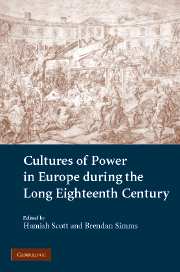Book contents
- Frontmatter
- Contents
- Preface
- List of contributors
- 1 Introduction: culture and power during the long eighteenth century
- 2 When culture meets power: the Prussian coronation of 1701
- 3 Military culture in the Reich, c. 1680–1806
- 4 Diplomatic culture in old regime Europe
- 5 Early eighteenth-century Britain as a confessional state
- 6 ‘Ministers of Europe’: British strategic culture, 1714–1760
- 7 Confessional power and the power of confession: concealing and revealing the faith in Alpine Salzburg, 1730–1734
- 8 The transformation of the Aufklärung: from the idea of power to the power of ideas
- 9 Culture and Bürgerlichkeit in eighteenth-century Germany
- 10 The politics of language and the languages of politics: Latin and the vernaculars in eighteenth-century Hungary
- 11 ‘Silence, respect obedience’: political culture in Louis XV's France
- 12 Joseph II, petitions and the public sphere
- 13 The court nobility and the origins of the French Revolution
- 14 The French Revolution and the abolition of nobility
- 15 Foreign policy and political culture in later eighteenth-century France
- 16 Power and patronage in Mozart's La clemenza di Tito and Die Zauberflöte
- 17 Between Louis and Ludwig: from the culture of French power to the power of German culture, c. 1789–1848
- Index
12 - Joseph II, petitions and the public sphere
Published online by Cambridge University Press: 17 July 2009
- Frontmatter
- Contents
- Preface
- List of contributors
- 1 Introduction: culture and power during the long eighteenth century
- 2 When culture meets power: the Prussian coronation of 1701
- 3 Military culture in the Reich, c. 1680–1806
- 4 Diplomatic culture in old regime Europe
- 5 Early eighteenth-century Britain as a confessional state
- 6 ‘Ministers of Europe’: British strategic culture, 1714–1760
- 7 Confessional power and the power of confession: concealing and revealing the faith in Alpine Salzburg, 1730–1734
- 8 The transformation of the Aufklärung: from the idea of power to the power of ideas
- 9 Culture and Bürgerlichkeit in eighteenth-century Germany
- 10 The politics of language and the languages of politics: Latin and the vernaculars in eighteenth-century Hungary
- 11 ‘Silence, respect obedience’: political culture in Louis XV's France
- 12 Joseph II, petitions and the public sphere
- 13 The court nobility and the origins of the French Revolution
- 14 The French Revolution and the abolition of nobility
- 15 Foreign policy and political culture in later eighteenth-century France
- 16 Power and patronage in Mozart's La clemenza di Tito and Die Zauberflöte
- 17 Between Louis and Ludwig: from the culture of French power to the power of German culture, c. 1789–1848
- Index
Summary
Tim Blanning, both in his book on Joseph II and in his Culture of Power, has held up the emperor as an example of a ruler who, like Frederick the Great and George III – though each in quite different ways – knew how to exploit the developing public sphere. Not only did Joseph change the Austrian Monarchy's censorship system so that anti-Catholic, progressive and critical writings could be published, but he had a ‘surprisingly deft touch for gesture politics’ – for example, when taking and driving a peasant's plough in Moravia in 1769, or when founding the Nationaltheater in Vienna in 1776. When the Danube burst its banks and flooded parts of Vienna in 1785, the emperor at once took charge of the rescue operation. He was determined that his very numerous decrees should be widely published, whereas his officials liked to keep them, as hitherto, semi-secret, partly no doubt so that they could interpret and apply them as they pleased. Ernst Wangermann has recently produced new evidence that Joseph and his ministers commissioned or rewarded some of the pamphlets that supported government policy, as had already been well known in the case of the vitriolic anti-Establishment pamphleteer Simon Linguet, who supported the emperor's claims on the Bavarian succession and over the opening of the Scheldt. Joseph actually offered asylum in Belgium to both Linguet and the radical Raynal, author of the anti-colonialist Histoire des deux Indes.
- Type
- Chapter
- Information
- Cultures of Power in Europe during the Long Eighteenth Century , pp. 249 - 268Publisher: Cambridge University PressPrint publication year: 2007
- 7
- Cited by

